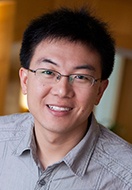Chemical bioengineers find and create bacteria for several different purposes, such as eating chlorine and consuming toxic byproducts of biodiesel plants. A closer look at these bacterial communities undertaken in a study at Washington University in St. Louis shows that there is actually a division of labor between bacterial workers and layabouts.
 Chemical engineer Fuzhong Zhang found that in a collection of engineered cells designed to produce certain chemicals, only a minority of the cells were actually doing any work. The others “weren't doing much of anything besides consuming energy intended for working cells,” as Zhang puts it in a recent WUSTL release.
Chemical engineer Fuzhong Zhang found that in a collection of engineered cells designed to produce certain chemicals, only a minority of the cells were actually doing any work. The others “weren't doing much of anything besides consuming energy intended for working cells,” as Zhang puts it in a recent WUSTL release.
Strange as this may sound, it doesn’t imply any malfunction or genetic defect within the cells. When it comes to productivity, there is natural “noise” or chaos that simply makes some cells more productive than others.
Desiring to maximize efficiency and productivity, Zhang and his team created a biological sensor called PopQC that can detect the amount of work being done. If it passes a threshold, PopQC releases a protein that causes the cell to grow; otherwise, it will either starve the cell or release an antibiotic. This way, the population is trimmed down to only the most productive members.
"PopQC could be applied to a variety of biosynthetic pathways and host organisms as long as a proper sensor exists that detects the product in the engineered host," says Zhang. “Because noise is a universal problem in biology, the design principle of this work should inspire engineers from many other fields to improve efficiency of engineered systems."
This study was funded by grants from the NSF. For additional information about funding for research at Washington University in St. Louis, read our free WUSTL Funding Statistics Report, available via the link below:
Biotechnology Calendar, Inc. visits Washington University in St. Louis each year for our St. Louis BioResearch Product Faire™ event, held on the WUSTL campus. This show is an excellent opportunity for life science scientists and laboratory equipment suppliers to network and discuss their research needs and solutions. Our next St. Louis BioResearch Product Faire is rapidly approaching, coming up on April 13, 2016. Biotechnology Calendar is a full service event company that has produced on-campus, life science research trade shows nationwide for the past 20 years. We plan and promote each event to bring the best products and services to the finest research campuses across the country. If you can’t make the St. Louis BioResearch Product Faire™ event, don't worry - you can check our 2016 schedule of events for an upcoming show in your area.


